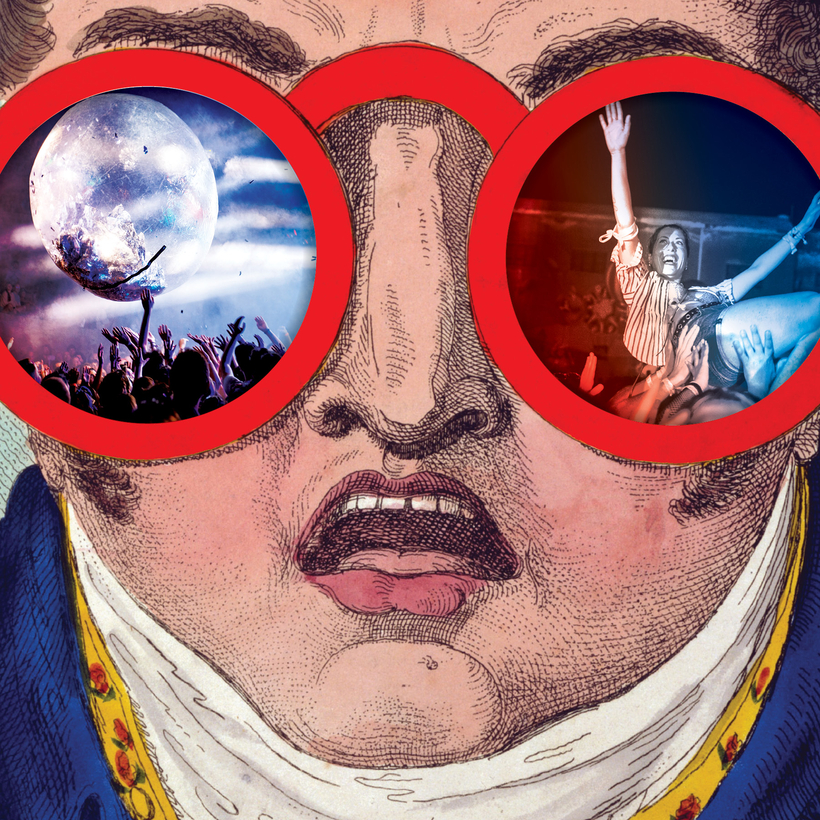If you’d told Alessandra Giada that a few months shy of her 26th birthday she’d be in the back of a drug dealer’s car on an eight-hour journey across rural Mexico, she wouldn’t have flinched.
Last October, Giada was at lunch at Entremar, a trendy restaurant in Mexico City, complaining to friends over fish tacos. Everyone was already in Oaxaca, a one-hour plane ride south, for a glamorous Día de los Muertos party. The event was being held in an abandoned church in the middle of the desert, with the popular D.J. duo Parallels performing. Influencers were flying in from around the world for it.
On Instagram, people were already posting photos in face paint and ponchos, among agave plants. Plane tickets to Oaxaca were completely sold out, as were car rentals.
After lunch, “we were picking up drugs” for a night out in Mexico City, Giada tells me, “when the dealer asked us if we wanted a ride” to Oaxaca. It seemed like the only option to get to that party on time, so she and her boyfriend agreed. After all, she says, “he looked nice enough, and he was driving an Audi Q6.”
A few hours later, Giada and her boyfriend were in the back seat, speeding down a Mexican highway as the dealer drove with one hand and alternated between swigs of beer and bumps of cocaine with the other. Then they stopped at a gas station, and a van full of military policemen pulled up. “There must have been $50,000 worth of drugs in the trunk. It was like one of the Audi bags, you know, where you keep the spare wheel, filled to the brim,” Giada says. “That’s when I realized, like, Shit, I’m really stupid.”
But the police didn’t stop the dealer, and, despite taking what Giada estimated was a gram of cocaine during the car ride, he got Giada and her boyfriend to the center of Oaxaca by nightfall, in time for them to hitch another ride to the party. Overall, Giada tells me, she had a good time—it was another story for the books, and the party was great.
The Evolution of FOMO
Fear of missing out is not new, but millennials made it a thing—and gave it an acronym—when social media invited users to see, and be jealous of, what other people were doing at any given time. Online, articles detail How to Get over FOMO, with recommendations ranging from taking deep breaths to putting social-media limits on cell phones. In the article “The Complete Guide to Getting Over FOMO (Fear of Missing Out)” on his Web site, Mark Manson, author of the best-selling self-help book The Subtle Art of Not Giving a F*ck, reminds readers that “there’s no such thing as a perfect beach. There’s no such thing as a perfect partner. There’s no such thing as a perfect night out … or a perfect group of friends.”
And yet social-media-enhanced FOMO is strong enough to outweigh all of that—even for the fabulously wealthy, who ostensibly have sufficient money and time to be anywhere and do anything they want. While for most of us, FOMO might lead us to overspend on a 30th-birthday party, or to sell a pair of Grandma’s shoes on Poshmark to pay for a fancy dinner, the young jet set has taken the lengths they will go to for fear of missing out to absurd levels.
“It’s not about where you are but whether you’re in the place to be,” the 23-year-old New York-based banker Claudio Bertone explains. For example, he says, “over Christmas this year, I was in Argentina, but it felt like everyone was in Lamu, in Kenya.”
The “places to be” are not hard to find. Follow certain social-media accounts and you’ll quickly discover that Thursdays are for Loulou’s in London, where privileged twentysomethings will snap photos from the now legendary staircase of the 5 Hertford Street members’ club. Fridays, group-dinner shots and close-ups of tuna tostadas from Contramar, in Mexico City, abound. On Saturday, there are photos of iced dirty martinis at another exclusive members’ club, this time in New York: Casa Cruz.
“I was in Argentina, but it felt like everyone was in Lamu, in Kenya.... It’s not about where you are but whether you’re in the place to be.”
The hard thing is keeping up. Attending the right restaurant, club, or holiday destination amounts to a full-time job, leading the young 1 percent to spend exorbitant amounts of time and money (often their parents’). And yet, at the mercy of FOMO, rich kids keep trying.
A 26-year-old creative director tells me about her recent journey from the small Brazilian town of Corumbau to a glamorous beach party on Trancoso, a nearby locale. “There are no paved roads, and you can’t take a boat at night,” she says. “So my brother and I ended up paying a local fisherman to take us on a three-hour beach-buggy ride. He charged us $1,000, plus we’d already spent $850 for the party.”
In December, when flights from London to Marrakech were sold out, one 30-year-old real-estate associate decided to fly through New York—eight hours from London to New York, then nine hours in the opposite direction, back over the Atlantic to Marrakech—to make it in time for an “Orient”-themed party at her friend’s villa. “O.K.,” she says, “I admit it. I had really bad FOMO.”
Posting a photo from the Black Rock Desert playa at Burning Man, which takes place on an ancient alkali flat in the Nevada desert, accompanied by a caption about what a magical, life-changing experience it was to have attended, is particularly coveted. A 25-year-old writer tells me about her harrowing journey to get to the music festival in time: “I took a four-hour ferry from Patmos, Greece, to neighboring Kos, then flew from Kos to Bologna, Bologna to Frankfurt, Frankfurt to Las Vegas, and Las Vegas to Reno, to stay at this tent I’d found on Facebook.” When she got there, the tent she’d paid $2,000 for ended up being nonexistent.
“I almost starved,” she says.
“O.K., I admit it. I had really bad FOMO.”
Last summer, meanwhile, just ahead of her father’s birthday party, in Ibiza, a 25-year-old psychology student was at her friend’s castle, in Sicily. “I didn’t want to leave, so I’d just buy flights every day and miss them,” she explained. Once she missed her fourth flight, she realized she wouldn’t make it in time for the party. “I ended up having to hire a private plane from Catania,” she says.
Travel mishaps—or what the rest of the world would call equal parts recklessness and entitlement—that culminate with private-jet rentals are common. “Just as covid was breaking out, in March 2020, there was the Jaipur Holi party, in India,” a 30-year-old art collector tells me. “I was like, ‘Fuck it, I’m not going to miss this for the world,’ so I left New York, and I went to India for three days.” When India started closing its borders, “they didn’t want to let me out,” he says, “and I had to find a jet to go back home.”
Yet, despite our Burning Man attendee’s report, starvation, or being stuck in a foreign country, or any other fathomable danger, seems not to apply to the young jet set, for whom a combination of wealth and diplomatic relationships goes a long way. It also keeps them on an eternal hamster wheel of dissatisfaction—of always seeking the next best thing.
Among everyone I spoke to, there seems to be little regret over the money and time wasted, or awareness of their own privilege. Instead, there’s a sense of pride. Driving across Mexico with a drug dealer could have ended in either murder or arrest, not to mention all the lives the drugs in that car could have helped ruin, but Giada shrugs. “Most of my friends would have done the same. And they’re all stories I can tell my kids when they grow up.”
Elena Clavarino is the Senior Editor for AIR MAIL


